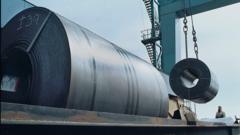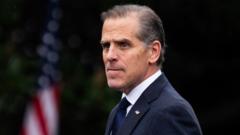President Trump's doubling of tariffs on steel and aluminium imports aims to safeguard US industry but has ignited fears of negative repercussions for global producers and domestic consumers alike.
US Doubles Steel and Aluminium Tariffs, Impacting Global Markets

US Doubles Steel and Aluminium Tariffs, Impacting Global Markets
President Trump's decision to raise tariffs on steel and aluminium imports to 50% raises concerns about retaliatory measures and economic fallout.
US President Donald Trump has signed a controversial executive order that doubles tariffs on imports of steel and aluminium, increasing the rate from 25% to a staggering 50%. This adjustment marks the second hike since March and goes into effect immediately. While Trump claims this move will safeguard the American steel industry, many industry stakeholders warn of potential chaos, rising costs, and trade retaliations from affected nations.
Hours before this announcement, businesses reliant on these metals were uncertain about the tariff escalation, hoping it was merely a negotiation tactic. The UK, however, has been granted an exemption, maintaining its previous 25% duty during ongoing trade discussions with the US.
Rick Huether, CEO of Independent Can Co, expressed grave concern that the sudden price surge would push his clients towards alternative packaging materials. "There's a lot of chaos," he lamented, emphasizing the abrupt nature of the tariff increase.
According to government data, the US is the world's largest steel importer, primarily sourcing from Canada, Brazil, Mexico, and South Korea. Despite prior tariffs on steel and aluminium during Trump's initial term, many imports had previously avoided duty following negotiations with trade allies. However, Trump ended these exemptions in March, citing frustration over their effectiveness.
During a recent rally, Trump asserted that the heightened tariffs would force businesses to purchase from American suppliers. He emphasized that the new rate would establish a barrier to foreign competition. "Nobody's going to get around that," he claimed, underlining the protective nature of the tariffs.
The reaction from international markets has been swift. Following the initial tariff increases in March, Canadian and EU officials indicated their readiness to retaliate with tariffs on US products. Olof Gill, spokesperson for the European Commission, confirmed that negotiations are ongoing in hopes of resolving the escalating trade tensions.
In the UK, the latest tariff hike exerts additional pressure on government officials to finalize trade agreements that could provide some protection from US tariffs. Trade Secretary Jonathan Reynolds expressed optimism about the negotiations, citing successful efforts to shield UK steel from the immediate impact of the 50% duties.
Despite these assurances, UK Steel's director, Gareth Stace, warned that the new tariffs could be catastrophic for British exports, with the potential for widespread order cancellations. Economists also caution that the US economy may experience adverse effects from rising prices linked to the tariffs, indicating that initial job gains in the steel industry could be offset by losses in other sectors.
In Illinois, Chad Bartusek, director at Drill Rod & Tool Steels, shared his dismay over the increased tariff costs, predicting a $145,000 bill compared to previous expectations of $72,000. He highlighted the instability in the market, stating that customer orders have become more cautious, necessitating reduced hours for his staff. "It's one punch after the other," he reflected, hoping for a swift resolution to these escalating tariff disputes.




















